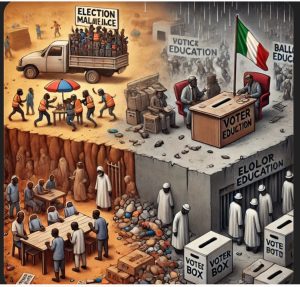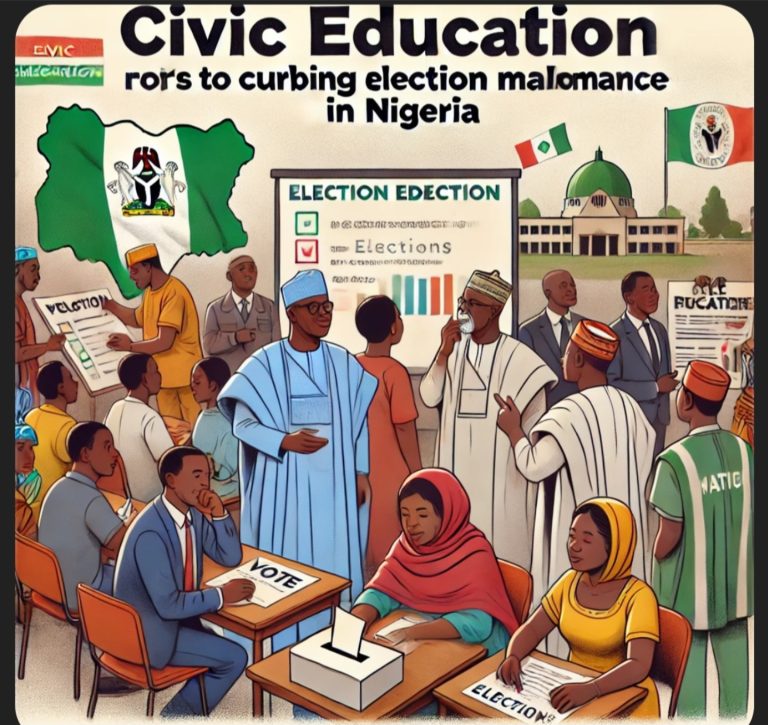By Suleman Ahmed Wan
A core element of democracy that functions as a celebration of creative, librarian, and equitable expressions. These decisions are crucial to the stabilization and development of a political system and are predicated on democracy (Ewuga & Lucky, 2019).
In a democratic society, civic participation in local and national politics is crucial. For this to happen effectively, citizens must be equipped with the knowledge, skills, and values needed for a stable and effective democracy. Civic education is fundamental as it helps citizens acquire the necessary political socialization (Aroge, 2012). As trainees in civic education, people are well informed about their rights and responsibilities, including their role in choosing their government. The main objectives of political education are:
– To familiarize citizens with the basic norms and characteristics of the institutions of a democratic political system.
– Inculcate values such as political tolerance, trust in the democratic process, respect for the rule of law and promote responsible and informed political participation.
Civic education plays an important role in teaching citizens about their rights and the responsibilities of the governed and heads of state. In Nigeria, the introduction of civic education in primary and secondary schools aims to deepen democratic culture and promote active participation in government. Civic education enables individuals to take responsibility for their work in a democratic state and learn from each other about individual freedoms.
“The importance of political education”
Civic education aims to enable individuals to participate fully and contribute to the creation of a democratic society (Branson, 1998). This includes the transmission of the country’s political traditions and the transmission of moral values (Janowitz, 1994). According to Lévis (2008), civic education consists of promoting the virtues, knowledge, skills, and experiences necessary for political participation and the maintenance of democracy.
.Civic education increases political awareness and organizes people politically through public interest groups, labor unions, and other organizations (Finkel, 2002; Crittenden & Levine, 2013). Peterson (2011) views civic education as a formative process that equips citizens with the knowledge, skills, and dispositions needed for effective citizenship.
“Electoral Fraud in Nigeria”
Elections are the cornerstone of any democratic political system and are the primary means by which citizens elect or remove their leaders. However, in Nigeria, the electoral process has been marred by various forms of fraud, including undue influence, vote buying, impersonation, bribery, and violence. These practices have undermined the integrity of elections and the democratic process.
According to Samuel (2014), electoral fraud involves the manipulation of electoral rules and regulations to favor certain interests. Bamisaye and Awofeso (2011) describe electoral fraud as the determination of politicians and political parties to gain power by any means necessary. This problem is not unique to Nigeria, but the country’s history is marked by a widespread struggle to control the electoral process for personal gain.
“Why electoral fraud is a problem”
The 21st century is marked by the rise of democracy and democratic institutions, with many countries adopting democratic systems of government. However, developing countries like Nigeria face significant challenges in holding free and fair elections. Lack of civic education and the reluctance of citizens to participate in the democratic process are major obstacles.
To address these challenges, citizens must be equipped with the skills, attitudes, and values necessary for democratic participation. Citizenship education plays a vital role in equipping citizens with the knowledge and understanding they need to exercise their rights, protect their interests, and uphold the rule of law.

“Conclusion and recommendations”
Nigerians desire democracy, but their perception of democracy is often distorted by various socio-political factors, including electoral fraud. Solutions to this problem must be sought at the institutional and individual levels. Policy makers must be held accountable and citizens must be made more politically aware and educated.
To achieve these objectives, it is recommended:
1. Develop a comprehensive civic education curriculum
Education stakeholders should develop a comprehensive civic education curriculum that addresses the identified problems.
2. Government campaigns Governments at all levels should launch rigorous campaigns to promote civic education and increase citizen participation in the democratic process.
3. Participation of non-governmental organizations
Non-governmental organizations (NGOs) should support government efforts to promote civic education to achieve genuine democracy and national development.
4. National Orientation Agency Initiatives
The National Orientation Agency should conduct political education programmes before the elections to raise awareness and encourage participation.
5. Election Fraud Tribunal.
The government should establish a competent tribunal to prosecute electoral fraudsters and ensure that justice prevails.
6. Values Reorientation.
A social reorientation is needed to promote values that support democratic principles and prevent electoral fraud.
Through these efforts, civic education can become a powerful tool to reduce electoral fraud and strengthen democracy in Nigeria.



